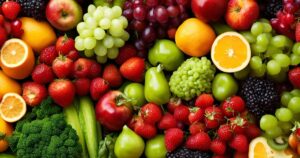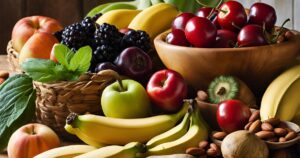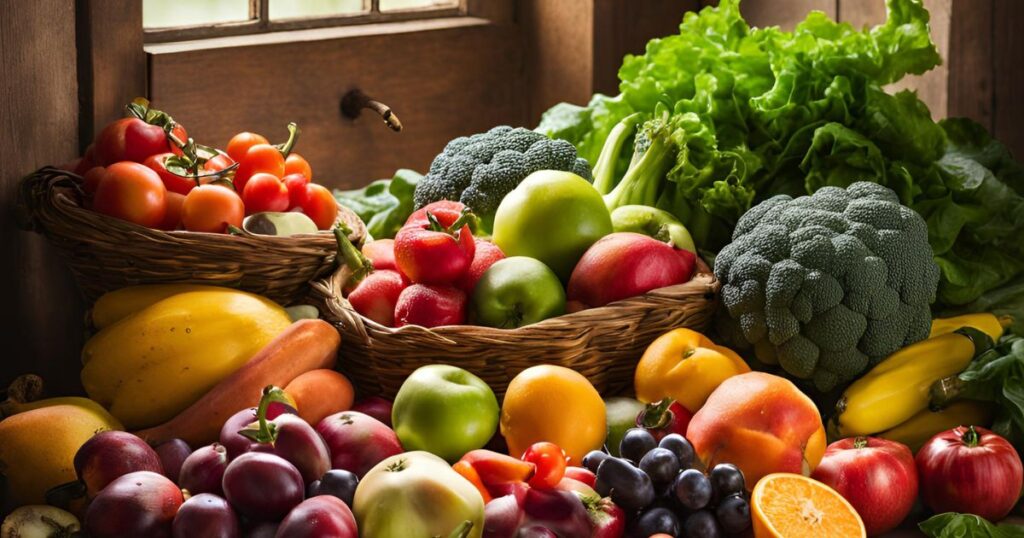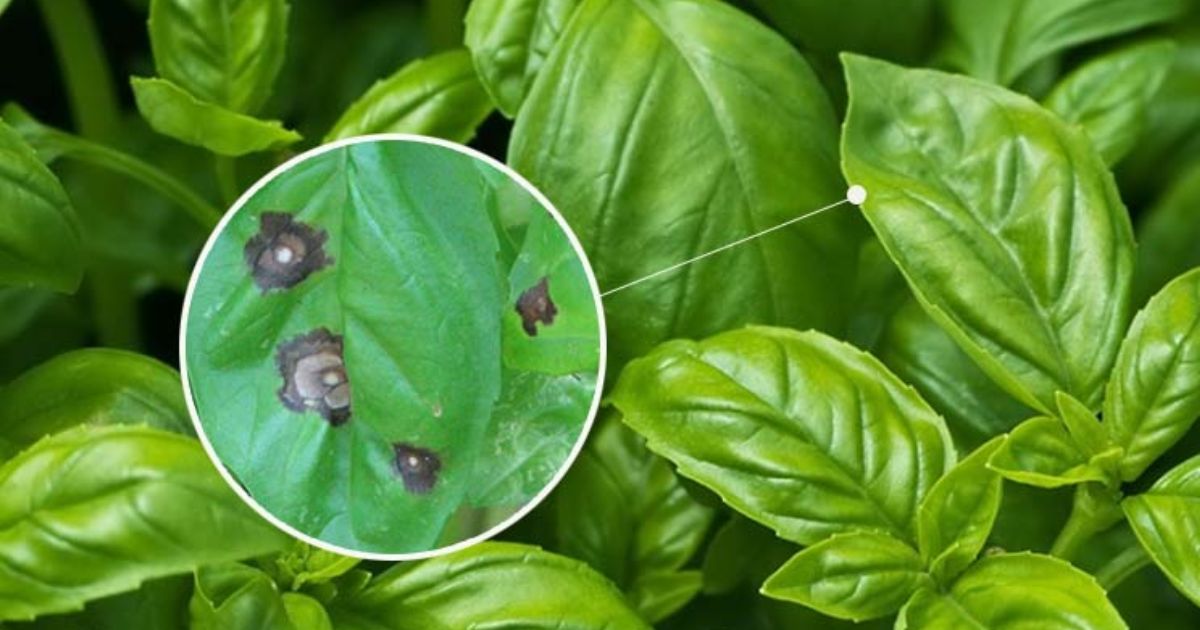It can be annoying to have trouble falling asleep at night, especially if it interferes with your ability to concentrate and have energy the following day. While many turn to sleep aids or other remedies, nature offers a simpler solution—what you eat. There are tons of minerals in some fruits and vegetables that can help you relax, calm your mind, and ease you into a restful night. In this article, we’ll explore 9 fruits and vegetables that help you fall asleep faster naturally, without the need for medications or supplements.
These sleep-boosting foods are rich in compounds like melatonin, magnesium, and tryptophan, which are known to support healthy sleep patterns. Whether you want to enjoy a kiwi before bed or add more spinach to your dinner, these nutrient-dense options can help you drift off more easily and wake up refreshed. Read on to discover the best natural options for improving your sleep quality.
How Fruits and Vegetables Can Improve Sleep
Vegetables and fruits are vital for general health and has the potential to significantly enhance sleep quality. They contain key nutrients that naturally promote relaxation, ease stress, and help regulate your body’s internal clock. Look closely at some sleep-enhancing nutrients found in common fruits and vegetables night.
Sleep-Enhancing Nutrients
- Melatonin: Sometimes called the “sleep hormone,“ vegetables with melatonin aids in controlling your circadian rhythm. Fruits like cherries and tomatoes are rich in melatonin, making them excellent natural options to promote better sleep.
- Magnesium: This mineral is vital for relaxation, as it helps calm the nervous system and relax muscles. Foods such as spinach, avocados, and does bananas keep you awake are high in magnesium, which prevents insomnia and enhances sleep quality.
- Potassium: Often found in bananas, sweet potatoes, and oranges, potassium helps to relax muscles and prevent cramps that could disrupt sleep. It also supports healthy blood pressure levels, reducing best fruits to eat at night stress on the body.
- Tryptophan: One necessary amino acid that the body needs is tryptophan converts into serotonin and melatonin, which are crucial for sleep regulation. Foods like bananas and spinach contain tryptophan, helping you feel calm and ready for rest.
Natural Sleep Aid
Incorporating fruits and vegetables rich in these nutrients into your evening meals or as bedtime snacks can be a natural sleep aid. As opposed to drugs, which may have adverse consequences or lead to dependency, these nutrient-dense foods offer a safe and gentle way to support a healthy sleep cycle. By consuming sleep-promoting foods, such as a kiwi or a handful of cherries, an hour or two before bed, you provide your body with the essential compounds to naturally produce vegetables with melatonin, calm your nerves, and relax your muscles.
You won’t need to use any supplements or pharmaceutical sleep aids if you include these fruits and vegetables in your diet to help you fall asleep more quickly, remain asleep longer, and wake up feeling rejuvenated.
9 Fruits and Vegetables That Help You Fall Asleep Faster Naturally

Improving sleep quality can be greatly enhanced by eating the correct foods. Nutrient-dense fruits and vegetables help your body’s sleep cycle and encourage calm. Here are nine of the best options that can help you fall asleep faster naturally:
1. Bananas
- Nutritional Benefits: Bananas are packed with potassium and magnesium, two elements that are essential for relaxing muscles and calming nerves. These elements help reduce physical tension, making it easier to unwind.
- Sleep Benefits: Bananas contain tryptophan, an essential amino acid that melatonin and serotonin are formed from, which help regulate your sleep-wake cycle. B bananas promote better sleep and help you fall asleep more quickly by boosting melatonin production.
2. Kiwi
- Nutritional Benefits: Kiwi is a nutrient powerhouse, rich in antioxidants like vitamin C and serotonin-boosting compounds.
- Sleep Benefits: Studies show that eating kiwi before bed can significantly improve sleep onset, duration, and quality. Its high serotonin content supports the body’s ability to relax, making it one of the most effective natural sleep aids.
3. Cherries
- Nutritional Benefits: Tart cherries in particular are among the few naturally occurring sources of melatonin, the hormone that regulates your body’s internal clock.
- Sleep Benefits: Drinking tart cherry juice or consuming fresh cherries before bedtime can help synchronize your sleep-wake cycle. Regular consumption may improve the quality and duration of your sleep, which facilitates quicker falling asleep.
4. Spinach
- Nutritional Benefits: Spinach is packed with magnesium, an essential mineral known for its ability to calm the body and mind. Additionally, it has calcium, which aids in the brain’s conversion of tryptophan to melatonin.
- Sleep Benefits: Magnesium deficiency is often linked to insomnia. By including spinach in your diet, you can help restore magnesium levels in your body, leading to more restful and deeper sleep.
5. Sweet Potatoes
- Nutritional Benefits: Sweet potatoes are rich in complex carbohydrates and potassium, supporting muscle relaxation and reducing stress.
- Sleep Benefits: Sweet potatoes’ complex carbohydrates digest slowly, maintaining steady blood sugar levels all can you eat pineapple at night. This can prevent those middle-of-the-night awakenings caused by sudden drops in blood sugar.
6. Tomatoes
- Nutritional Benefits: Tomatoes are high in lycopene, a powerful antioxidant that supports overall health. They also contain a small amount of melatonin.
- Sleep Benefits: Eating tomatoes in the evening can enhance sleep efficiency. The combination of lycopene and melatonin helps improve the quality of your rest by supporting your body’s natural sleep patterns.
7. Avocados
- Nutritional Benefits: Avocados make a fantastic source of magnesium and healthy fats that encourage relaxation and muscle recovery.
- Sleep Benefits: Consuming avocados can help reduce tension and promote better sleep by relaxing your muscles and nervous system. The fats in avocados also help stabilize blood sugar levels, preventing nighttime disturbances.
8. Lettuce
- Nutritional Benefits: Lettuce contains lactucarium, a calming and soothing compound.
- Sleep Benefits: Consuming lettuce, whether in a salad or as tea, can help relax your nervous system and induce sleep. Due to its soothing effects, it is often recommended as a natural remedy for insomnia.
9. Oranges
- Nutritional Benefits: Oranges contain a lot of vitamin C and potassium, which help reduce stress and support a healthy nervous system.
- Sleep Benefits: The calming properties of oranges can reduce anxiety and lower cortisol levels, allowing you to drift into sleep more easily. Additionally, the vitamin C in oranges boosts your immune system, which supports overall wellness for better sleep.
You can naturally promote better sleep by incorporating these fruits and vegetables into your diet. They help your body relax, regulate melatonin production, and support stable blood sugar levels; this is necessary to get to sleep more quickly and enjoy a more restful night’s sleep Bare Root Strawberries.
Tips for Including These Fruits and Vegetables in Your Diet

Incorporating sleep-enhancing fruits and vegetables into your daily meals is easier than you might think. With a few simple tweaks to your diet and timing, you can naturally improve your sleep quality and fall asleep faster. Here are some practical tips to help you include these nutrient-rich foods in your routine.
1. Bedtime Snacks
Light snacks before bedtime can help you drift off to sleep, especially if you choose the right combinations of sleep-friendly fruits and vegetables. Here are a few ideas:
- Banana & Almond Smoothie: Blend a banana with a handful of foods to make you fall asleep help you sleep and a splash of almond milk. This combination provides magnesium, tryptophan, and healthy fats that promote relaxation.
- Kiwi & Spinach Smoothie: Mix a couple of kiwis with a handful of spinach and some water or coconut water. This nutrient-packed smoothie is a perfect bedtime snack that boosts serotonin and helps calm the body.
- Cherries & Yogurt: Enjoy a small bowl of tart cherries mixed with yogurt. The cherries provide melatonin, and the yogurt adds calcium, which helps in melatonin production.
- Avocado Toast with Tomatoes: Spread mashed avocado on whole-grain toast and top with sliced tomatoes. This light snack is rich in magnesium and melatonin, perfect for winding down before sleep.
2. Meal Ideas
Including these fruits and vegetables in your main meals is also a great way to promote better sleep. Try some of these meal ideas to boost your intake of sleep-enhancing nutrients:
- Spinach Salad with Avocado: Make a fresh salad using spinach, avocado, and a drizzle of olive oil. Moreover, you can include some nuts or seeds for an extra magnesium boost. This light dinner can help you relax and get ready for bed.
- Sweet Potato Mash with Cherry Sauce: Cook and mash sweet potatoes, and top them with a homemade tart cherry sauce (heat tart cherries with a little water until soft). This meal is high in complex carbohydrates, potassium, and melatonin, perfect for a calming dinner.
- Tomato & Lettuce Wraps: Use large lettuce leaves to wrap up sliced tomatoes, avocado, and a sprinkle of salt. These wraps are refreshing and packed with nutrients that help relax the body and prepare for sleep.
- Banana Oatmeal: Start your day or have an evening snack with a warm bowl of oatmeal topped with sliced bananas. The combination of complex carbs and tryptophan-rich bananas is great for promoting relaxation. Best Strawberry Types for Every Season.
3. Timing
Timing is key when consuming sleep-enhancing foods. Eat these fruits and vegetables about 1-2 hours before bedtime. This allows your body enough time to digest and absorb the nutrients, particularly melatonin and tryptophan that help induce sleep.
- Steer clear of big, substantial meals immediately before bed, since doing so can keep you from going to sleep.
- If you’re hungry close to bedtime, opt for light snacks or smoothies, focusing on foods rich in magnesium, melatonin, and potassium.
Including these fruits and vegetables in your diet on a regular basis in the right combinations and at the right times can significantly impact how quickly and easily you fall asleep. By planning your meals and snacks around these sleep-friendly foods, you’ll naturally support a healthier sleep cycle without needing medications or supplements.
Other Natural Ways to Improve Sleep
In addition to incorporating sleep-enhancing fruits and vegetables into your diet, you can use several other natural strategies to improve your sleep quality. These tips focus on hydration, lifestyle changes, and relaxation techniques that promote restful, uninterrupted sleep.
1. Hydration
It’s crucial to drink enough water throughout the day to sustain good health and regulate your sleep cycle. Dehydration can lead to difficulty falling asleep and staying asleep. However, it’s important to balance your fluid intake, especially as bedtime approaches:
- To stay hydrated throughout the day, continuously sip water, but avoid drinking large amounts of liquid 1-2 hours before bed to prevent frequent night awakenings due to bathroom trips.
- Teas made with herbs, like chamomile or lavender, can be a relaxing and hydrating option in the evening without overloading your bladder.
2. Lifestyle Tips
Your daily habits and bedtime routine significantly affect your capacity to drift off to sleep. You can naturally improve your sleep quality by making small adjustments to your lifestyle. Here are a few effective tips:
- Reduce Screen Time: Cell phones, laptops, and televisions emit blue light, which disrupts the creation of melatonin and makes it more difficult for your body to go to sleep. Try to limit screen exposure at least 30-60 minutes before bed. Instead, pick calming activities like reading or journaling.
- Establish a Bedtime Routine: A consistent bedtime routine helps signal your body that it’s time to sleep. Activities like taking a warm bath, dimming the lights, or listening to calming music can help create a soothing environment. Even on weekends, going to bed and waking up at the same times each day helps maintain your internal clock.
- Practice Relaxation Techniques: Incorporating relaxation techniques like yoga, deep breathing techniques or meditation can greatly lower stress and anxiety, both common causes of insomnia. Practicing mindfulness or progressive muscle relaxation before bed facilitates falling asleep by calming the body and psyche.
Staying hydrated, reducing screen time, and creating a calming bedtime routine can complement the sleep-promoting benefits of the right fruits and vegetables. Together, these natural methods will support healthier, more restful sleep.
Conclusion
Incorporating these 9 fruits and vegetables that help you fall asleep faster naturally can greatly enhance your sleep quality. Nutrient-packed options like bananas, kiwis, cherries, spinach, and sweet potatoes are rich in essential sleep-promoting compounds like magnesium, melatonin, and tryptophan. Adding these foods to your diet gives your body the natural support it needs to relax, control your body’s clock to get deeper, more peaceful slumber.
Now it’s your turn to take action! Start incorporating these fruits and vegetables into your meals and snacks, and see how they positively impact your sleep. Try some suggested recipes and bedtime snack ideas, and experiment with what works best for you.
We’d love to hear about your experience! Have you noticed any changes in your sleep after trying these foods? Share your thoughts and favorite sleep-friendly recipes in the comments below! Your tips and insights might also help others find their perfect bedtime routine.
FAQs:
1. How do fruits and vegetables help improve sleep?
Fruits and vegetables contain essential nutrients like magnesium, melatonin, potassium, and tryptophan, which help relax muscles, calm the mind, and regulate the sleep-wake cycle. These nutrients promote natural sleep without the need for medication.
2. What are the best fruits to eat for better sleep?
Some of the best fruits for sleep include bananas, kiwis, and cherries. Bananas are rich in magnesium and tryptophan, kiwis are high in antioxidants and serotonin-boosting nutrients, and cherries are among the rare naturally occurring sources of melatonin.
3. Can eating vegetables really help me fall asleep faster?
Yes! Vegetables like spinach, lettuce, and sweet potatoes are rich in sleep-promoting nutrients. Spinach is high in magnesium, which helps relax the body, while sweet potatoes and lettuce contain potassium and other calming compounds that aid in relaxation and sleep.
4. When is the best time to eat sleep-promoting foods?
It’s best to eat these sleep-enhancing fruits and vegetables about 1-2 hours before bedtime. This allows your body enough time to digest and absorb the nutrients, helping to relax your muscles and calm your mind for restful sleep.





